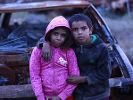Eye For Film >> Movies >> Toomelah (2011) Film Review
Whenever 10-year-old Daniel (Daniel Connors) is asked, "Where you been?" or "Where you going?", his response is always the same: "Nowhere."
This question-and-answer mantra, frequently repeated in Ivan Sen's film, comes to resemble a catechism of community nihilism and despair. The community, as the title suggests, is Toomelah, in the far north of New South Wales on the Queensland border - although Toomelah used to be elsewhere until, in 1937, the government rounded up all the native Gamilaraay people and moved them by truck to this reservation 100km east. The reservation eventually became a Pentecostal missionary, while its residents were exploited by neighbouring farmers for virtual slave labour – and several of its younger members were to join the shameful ranks of the 'stolen children', forcibly removed from their homes into state 'protection'.

All this is history, reduced within the film to charts, posters and pictures (going back to the violent colonisation of the area in 1849) that are glimpsed by Daniel on his school library's wall. Even if, in the film's opening sequence, Daniel turns his back on school and the indigenous 'lingo' that is still being taught there, this history has nonetheless left its scars on the entire community, including Daniel himself. Heir to the legacy of generations successively uprooted, Daniel will seek to address his own rootlessness in a vain quest for a reliable father figure.
The first thing we see in Toomelah is a row of boxing trophies won by Daniel's father Michael (Michael Connors) – although that was from a time before "the metho knocked him" and his chronic alcoholism saw him kicked out by Daniel's mother. "Don't be like your old man," is the best advice that Michael can offer his son, delivered literally from a gutter – although Michael also, like others, encourages Daniel to return to school.
Instead, Daniel gets into fist fights, not just in imitation of his father but also in explicit defense of his father's honour. Meanwhile, the gap left by Michael's absence is soon filled by Linden (Christopher Edwards) and his mates – low-level dope dealers who readily adopt Daniel into their gang. Daniel's mother may tell him off for smoking 'yarndi' with the boys - "Don't look like that," she says, "you look like your father" – but her words are undermined by the fact that she regularly sends Daniel to buy 'sticks' from Linden for her own use. Indeed everyone, save for Linden, advises the young boy not to do as they do – a sure sign of a community at odds with itself in the preservation of values. As Daniel learns to cut marijuana and starts following Linden around on his dealing circuit, we start to see exactly why the young boy is going 'nowhere'. Only Daniel's friend Tanitia (Danieka Connors) offers a different future, rooted in education and the avoidance of crime – but the couple had split up before they have even started going out together.
The past keeps returning to Toomelah - not just in the form of Michael, back from one of his benders, or of Daniel's old aunt, wrested away from her family as a young girl and now sadly, silently revisiting for the first time in decades the ruins of her childhood. For there is also Bruce (Dean Daley-Jones) - the former lover of Daniel's mum, and possibly even Daniel's actual father – who after a long, lonely stint in jail for doing "bad things", is back on the mission and encroaching upon Linden's turf. Bruce's return makes both violence inevitable, and (more surprisingly) change possible. Before this, however, Bruce will drive Daniel out to the river for a fatherly talk, both tense and strangely tender, on the tragic inevitabilities that result from trying to be a "bad cunt" - inevitabilities that we will then see playing themselves out all over again in Linden's posturing bid to become Toomelah's top dog.
There is the barest skeleton of a genre crime story to lend the film trajectory, but for the most part Toomelah is a realist portrait – almost a documentary - of the place where Sen's mother was born and bred, and of the people who appear in the film playing variants of themselves. Despite the laconic, often disarmingly coarse nature of the dialogue (subtitled for the viewer's benefit), no character is caricatured, and even the ostensible 'bad boys' of the piece are well-rounded and refreshingly free from lazy demonisation.
Sen does not flinch from showing a community plagued by misguided models of masculinity, but offsets this hopelessness with a qualified optimism for a different kind of cultural continuity. Aunties continue teaching the traditional language, a system of totemic identification is maintained (if not always fully understood), and when there is no father to whom Daniel can turn, there is always his majestic old Nan. And if something as beautiful and moving as this film can emerge from the folk of Toomelah, then there must be hope amidst all the misery. Sen has proven once again, as he did with his feature debut Beneath Clouds (2002), that even as he pokes and prods painfully at his damaged roots, he is definitely going somewhere.
Reviewed on: 11 Sep 2012
















